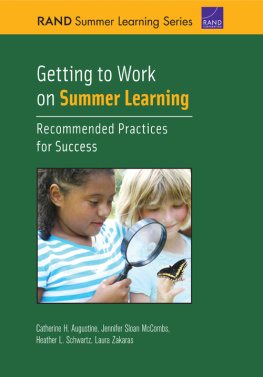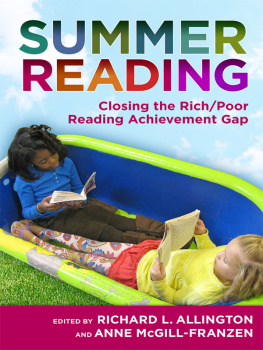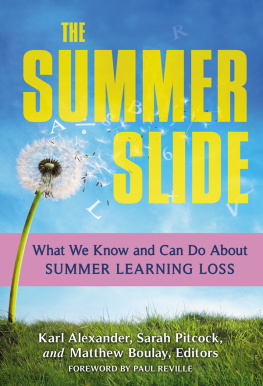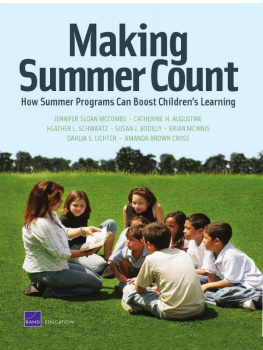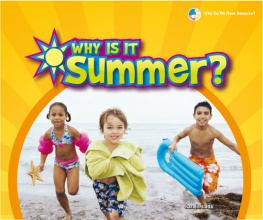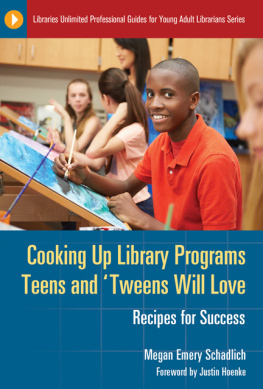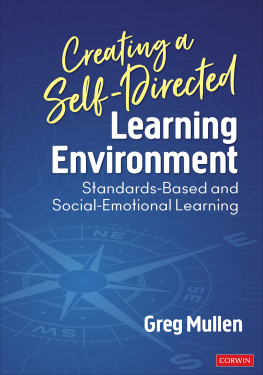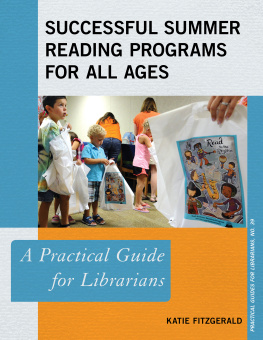Getting to Work
on Summer Learning

Recommended Practices
for Success
Catherine H. Augustine, Jennifer Sloan McCombs,
Heather L. Schwartz, Laura Zakaras

The research in this report was produced within RAND Education, a unit of the RAND Corporation. The research was commissioned by The Wallace Foundation.
Library of Congress Cataloging-in-Publication Data
eISBN: 978-0-8330-8134-6
The RAND Corporation is a nonprofit institution that helps improve policy and decisionmaking through research and analysis. RANDs publications do not necessarily reflect the opinions of its research clients and sponsors.
Support RANDmake a tax-deductible charitable contribution at www.rand.org/giving/contribute.html
RAND is a registered trademark.
Cover design by Dori Gordon Walker
Copyright 2013 RAND Corporation
This document and trademark(s) contained herein are protected by law. This representation of RAND intellectual property is provided for noncommercial use only. Unauthorized posting of RAND documents to a non-RAND website is prohibited. RAND documents are protected under copyright law. Permission is given to duplicate this document for personal use only, as long as it is unaltered and complete. Permission is required from RAND to reproduce, or reuse in another form, any of our research documents for commercial use. For information on reprint and linking permissions, please see the RAND permissions page (www.rand.org/pubs/permissions.html).
RAND OFFICES
SANTA MONICA, CA WASHINGTON, DC
PITTSBURGH, PA NEW ORLEANS, LA JACKSON, MS BOSTON, MA
DOHA, QA CAMBRIDGE, UK BRUSSELS, BE
www.rand.org
Preface
This report offers guidance to district leaders across the country who are interested in launching summer learning programs or improving programs that are already established. Our recommendations are based on the evaluations of summer programs in six urban districts in the summer of 2011. These districtsBoston; Cincinnati; Dallas; Duval County, Florida; Pittsburgh; and Rochester, New Yorkwere selected for a multiyear demonstration project funded by The Wallace Foundation to assess their effectiveness in improving student achievement. They are among the nations most advanced in their experience with comprehensive, voluntary summer learning programs.
This is the first in a series of reports that will result from the evaluation. A separate report, Making Summer Count: How Summer Programs Can Boost Childrens Learning (McCombs et al., 2011) synthesized the research on summer learning loss, identified the key features of effective summer learning programs supported by research, and investigated the ways that more than 20 program leaders were managing the challenges of implementing such programs. Building on that material, this report offers lessons learned from detailed evaluations of the district programs in the demonstration project in the summer of 2011. These evaluations were designed to help the districts improve the programs they offered in 2012. We have since completed evaluations of the summer 2012 programs, so that districts could further strengthen their programs by the summer of 2013, during a randomized controlled trial to assess the programs effects on student performance. Three forthcoming reports will present the results of the trial. A PDF file containing the appendix material to this document is available on the RAND websites product page for this research report (http://www.rand.org/pubs/research_reports/RR366.html).
This study was undertaken by RAND Education, a unit of the RAND Corporation that conducts research on prekindergarten, kindergarten12th grade, and higher education issues such as assessment and accountability, choice-based and standards-based school reform, vocational training, and the value of arts education and policy in sustaining and promoting well-rounded communities.
This study was sponsored by The Wallace Foundation, which seeks to support and share effective ideas and practices to improve learning and enrichment opportunities for children. Its current objectives are to improve the quality of schools, primarily by developing and placing effective principals in high-need schools; improving the quality of and access to after-school programs through coordinated city systems and by strengthening the financial management skills of providers; reimagining and expanding learning time during the traditional school day and year as well as during the summer months; expanding access to arts learning; and developing audiences for the arts. For more information and research on these and other related topics, please visit its Knowledge Center at www.wallacefoundation.org.
Figures and Tables
Figures
Tables
Summary
Summer learning programs have emerged as a promising way to address the growing achievement gap between children of the poorest families and those of the most affluent. Research shows that during summer, low-income students suffer disproportionate learning loss and those losses accumulate over time, contributing substantially to the achievement gap between low- and higher-income children. In addition, summer programs can benefit struggling students of all backgrounds by providing additional time to learn material they did not master during the school year. Many school districts offer mandatory summer programs to students at risk of grade retention, but fewer districts offer summer learning programs to a broader population of students as a means of stemming summer learning loss and boosting academic performance.
The Wallace Foundation is funding a multiyear demonstration project to determine whether district summer learning programs can stem summer learning loss for low-income students. This report distills the lessons learned so far from evaluations of programs offered in summer 2011 in six districts selected for the demonstration project. These districtsBoston; Cincinnati; Dallas; Duval County, Florida; Pittsburgh; and Rochester, New Yorkhave committed to offering such programs to large numbers of at-risk elementary students. These are all voluntary programs that offer reading, mathematics, and enrichment activities (such as arts, sports, and science exploration); operate for a full day; provide transportation to students; are free of charge; and share a goal of maintaining or improving student achievement. They all served students rising from third into fourth grade (the focus of our evaluations), and most districts served other grade levels as well.
To gather information for our evaluations, we interviewed summer program stakeholders, such as district leaders and summer site leaders and teachers; surveyed teachers, parents, and students; observed program training, instruction, and logistics; engaged professors of elementary education reading and mathematics to review the curricula; gathered program cost data; and analyzed district data on attendance. Our analysis of all this information, combined with our review of education research (including studies of the characteristics of strong summer programs), led to a diagnosis of the key strengths and weaknesses of each program, as well as recommendations for improvement tailored to each district. The detailed evaluations that went to each district were designed to help them improve their programs before the summer of 2013, when we will conduct a randomized controlled trial to answer the key question: Are these programs improving student outcomes?

